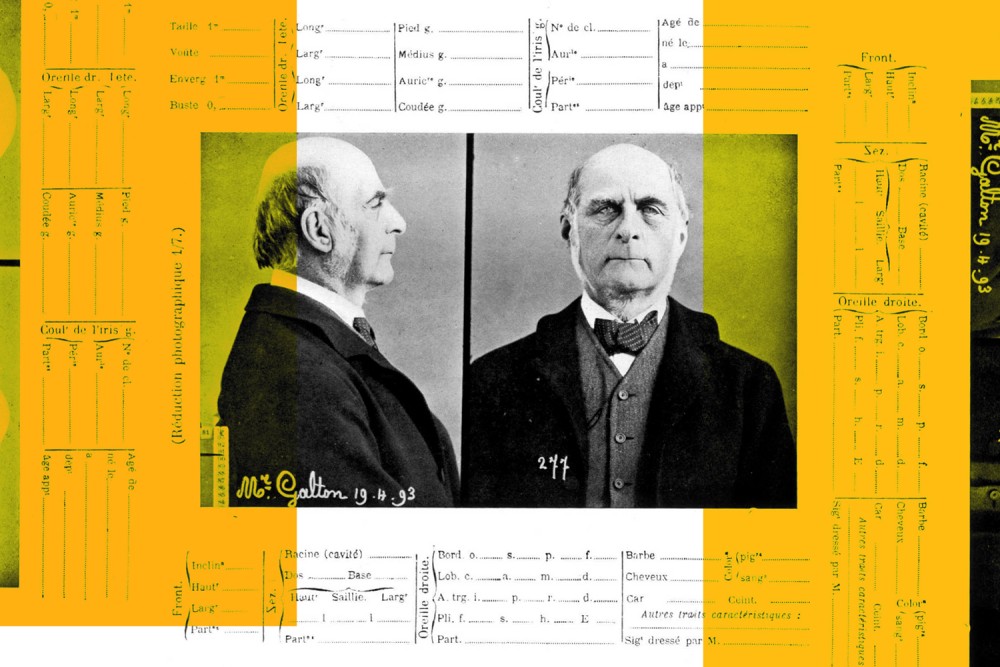
Francis Galton in 1893 (from Karl Pearson’s The Life, Letters, and Labors of Francis Galton / Public domain)
In the summer of 1876, in a workshop on the outskirts of London, Francis Galton was busy fashioning brass tubing into an ultrasonic whistle. This unique sliding whistle would produce high-pitched sounds at frequencies above the limit of human hearing. Galton tested his invention on the streets of London by blowing it near dogs and charting their reactions. Today, many hunters and dog trainers swear by modern iterations of this original whistle.
By the late 20th century, the term dog whistle referred as well to a kind of political statement that bears coded language. Dog whistle political messaging involves language that may sound innocent but is in fact carefully calculated: it carries one meaning for the general population but a secondary meaning to a targeted subgroup. Although leaders from across the political spectrum use dog whistles to stir associations among different audiences, the nefarious tactic of stoking racial prejudice by encouraging White voters to perceive Black and Brown populations as a threat belongs almost exclusively to right-wing politicians and propaganda outlets.
Read our latest issue or browse back issues.
The intentional use of abstract code language to hide racist appeals below the surface gives dog whistle messaging its disturbing cleverness. As long ago as 1981, GOP strategist Lee Atwater noted this abstraction in an interview in which he discussed Richard Nixon’s southern strategy and its evolution in the tax cut policies of the 1980s:
You start out in 1954 by saying, “ni**er, ni**er, ni**er.” By 1968, you can’t say “ni**er”—that hurts you. Backfires. So, you say stuff like forced busing, states’ rights, and all that stuff. You’re getting so abstract now, you’re talking about cutting taxes. . . . I’m saying that it is getting that abstract, and that coded, that we are doing away with the racial problem one way or the other. . . . “We want to cut this” is much more abstract than even the busing thing, and a hell of a lot more abstract than “ni**er, ni**er.”
Among those turning to dog whistles nowadays, the GOP’s most popular presidential candidate has all but mastered the tactic. With what appears to be deep personal satisfaction, Donald Trump regularly sprinkles dehumanizing and hate-filled lines into his speeches, only to pivot quickly away from accepting responsibility for any harm they encourage.
So, where can we find a word that names the scourge of dog whistle politics, one that calls out the threat it poses to democracy and a pluralistic society? Going straight to Jesus is one option: “Beware of false prophets, who come to you in sheep’s clothing but inwardly are ravenous wolves. You will know them by their fruits. Are grapes gathered from thorns or figs from thistles?” (Matt. 7:15–16).
We can’t know exactly who the false prophets were to whom Jesus refers. But his warning of their pernicious behavior is unmistakable. It’s not difficult to parse his words: They’re looking to take advantage of you. They will consume your soul. Their outward appearance may seem harmless and righteous, but that’s only because they don a sheep’s coat to look innocent and respectable. Their inward strategy is voracious. Their mission is deadly. They are deceptive to the core.
By all accounts, Francis Galton was a brilliant polymath. His groundbreaking discoveries in cartography, meteorology, psychology, and statistics set him apart from some of Europe’s best. But his pioneering work in the field of eugenics—he coined the term itself in 1883—taints his legacy. As Galton was busy constructing a racial hierarchy with White people at the top, he was also in his workshop building a whistle that would do more than produce sounds beyond human hearing. He was creating a device that would provide the subtle undertones of racial animus for generations to come.
We shall be known by our fruits.






